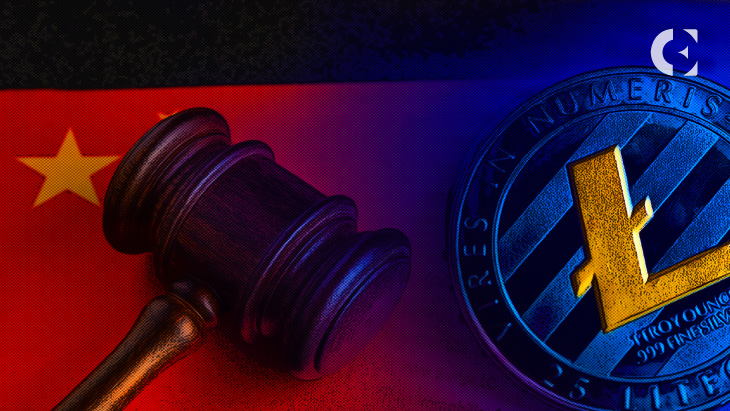- A Chinese court ruled that its citizens may trade in crypto but must not use it as legal tender.
- The judge emphasized the absence of rules forbidding viewing Litecoin as an illicit asset.
- China courts have rendered inconsistent rulings on the handling and trade of digital assets in recent times.
Despite the nation’s ban on digital asset services, a Chinese court has decided that its people may continue to trade cryptocurrencies.
According to the Beijing Number One Intermediate People’s Court, interested investors may only trade cryptocurrencies as virtual assets rather than as a form of legal currency.
The decision was reached in a case involving a Litecoin (LTC) loan with the promise of receiving interest payments in other digital currencies. According to the case circumstances, crypto investor Zhai Wenjie lent his buddy Ding Hao 50,000 LTC in 2015. The defendant, Ding Hao, refuted Zhai Wenjie’s claim that Ding Hao agreed to pay 1,000 LTC monthly interest.
The presiding judge emphasized that LTC could not be recognized as a currency, despite the court’s acknowledgment of the current Chinese restriction on cryptocurrency trade. Any legal or financial structures do not back LTC, the court claims, and is not issued by a monetary authority.
The court stated:
According to real administrative regulations and cases, our country only denies the monetary attributes of virtual currency and prohibits its circulation as currency, but the virtual currency itself is a virtual property protected by the law.
The judge in the case emphasized the absence of rules that would forbid the view of Litecoin as an illicit asset. As a result, the judge ordered the defendant to return Litecoin after finding that the complainant had provided evidence indicating the defendant had borrowed a cryptocurrency.
It is important to note that several Chinese regional courts have rendered inconsistent rulings on the handling and trade of digital assets. For instance, the Shanghai High People’s Court determined that Bitcoin had a “certain economic worth” and was protected by national law.
More Trending Posts from Coin Edition:
- ATOM Price Prediction: Will ATOM reach $40 in 2022?
- ERN Price Prediction: Will ERN Price Hit $10 in 2022?
- SPELL Price Prediction: Will SPELL Price Hit $0.02 in 2022?
- LUNC Price Prediction: Will LUNC Reach $0.001 in 2022?
- ENS Price Prediction: Will ENS Price Hit $50 in 2022?
- SWEAT Price Prediction: Will SWEAT Price Reach $0.1 in 2022?
Disclaimer: The information presented in this article is for informational and educational purposes only. The article does not constitute financial advice or advice of any kind. Coin Edition is not responsible for any losses incurred as a result of the utilization of content, products, or services mentioned. Readers are advised to exercise caution before taking any action related to the company.







